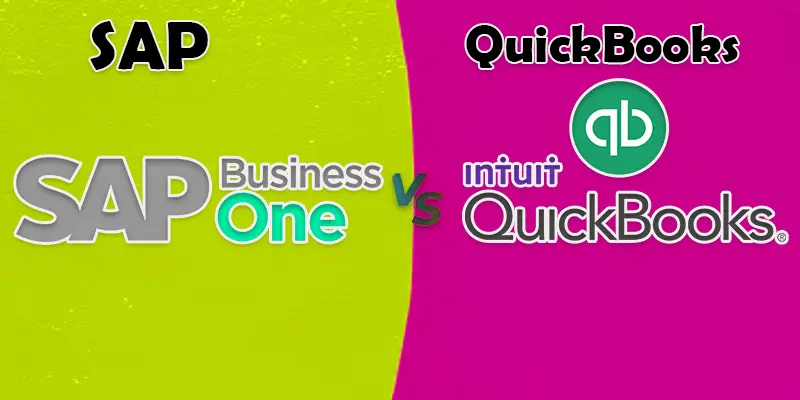QuickBooks vs SAP | Key Differences You Should Know
Published: 23 Jun 2025
SAP vs QuickBooks
Choosing between SAP vs QuickBooks can feel tricky, especially when both tools manage your business finances in different ways. SAP is a powerful system used by big companies, while QuickBooks is simple and made for small businesses. But how do you know which one fits your needs best? If you’re tired of juggling spreadsheets or using tools that don’t scale, this guide will help you decide with real-world examples and easy tips.
What is SAP
SAP is a software that helps big companies run their business. It manages things like money, inventory, sales, and employees. Think of it as a smart system that keeps everything in one place.
What is the QuickBooks
QuickBooks is a simple accounting software for small businesses. It helps you track money, send invoices, and manage bills. It’s easy to use, even if you’re not an accountant.

Difference Between SAP and QuickBooks
The main difference between SAP and QuickBooks is that SAP is made for big businesses with complex needs, while QuickBooks is best for small businesses and simple tasks.
| SAP | QuickBooks |
|---|---|
| A powerful software for big companies to manage all parts of their business. | A simple tool to handle accounting for small businesses. |
| Best for large or growing businesses. | Best for small to medium businesses. |
| Covers everything finance, HR, inventory, and more. | Focuses mainly on accounting tasks. |
| Complex and needs training. | Easy to use with a clean interface. |
| Takes longer and needs expert help. | Quick setup with step-by-step guides. |
| Steep learning curve. | Easy to learn for beginners. |
| Highly customizable for different industries. | Limited customization. |
| Expensive, based on custom plans. | Affordable with fixed monthly pricing. |
| Scales well for very large businesses. | Works for small growth but limited for large scale. |
| Advanced inventory and supply chain tools. | Basic inventory tracking. |
| Strong payroll and employee tools. | Simple payroll options. |
| Full multi-currency support for global use. | Supports multiple currencies, but limited features. |
| Detailed and customized reports. | Basic financial reports. |
| Connects with many other enterprise tools. | Integrates with apps like PayPal and Shopify. |
| Available both on cloud and on-premise. | Mostly cloud-based and mobile-friendly. |
| Enterprise-level support with training. | Online help, community, and phone support. |
| Available but not beginner-friendly. | Easy-to-use mobile app for small tasks. |
| Real-time data processing across departments. | Good for real-time finance tracking. |
| Handles complex tax rules for big businesses. | Great for basic tax management. |
| A car manufacturer uses SAP to track inventory, sales, and employee data. | A bakery uses QuickBooks to send invoices and track daily sales. |
Which One Should You Choose?
Choose SAP if:
- You run a large or fast-growing business.
- You need advanced tools for inventory, HR, or supply chain.
- You have a team that can handle setup and training.
- You want a system that works across many departments.
Choose QuickBooks if:
- You own a small business or work solo.
- You need easy accounting and billing features.
- You want a quick setup and simple reports.
- You prefer a low-cost monthly plan.

Conclusion About QuickBooks vs SAP
The comparison of sap vs quickbooks shows that each software suits different business needs. Personally, I recommend QuickBooks for small to mid-sized businesses because it is easier to use and cost-effective. However, if your company needs advanced features and scalability, SAP is a better choice. Take a closer look at your business goals and try the demos to find the perfect fit for you.
FAQS
Yes, SAP is a good accounting system. It is powerful and works well for big companies with complex needs.
SAP can be expensive and hard to learn, especially for small businesses.
Yes, QuickBooks can integrate with SAP using special tools or connectors.
This is tricky because SAP is a type of ERP system. So, SAP is one of many ERP options. The better choice depends on your business needs.

- Be Respectful
- Stay Relevant
- Stay Positive
- True Feedback
- Encourage Discussion
- Avoid Spamming
- No Fake News
- Don't Copy-Paste
- No Personal Attacks

- Be Respectful
- Stay Relevant
- Stay Positive
- True Feedback
- Encourage Discussion
- Avoid Spamming
- No Fake News
- Don't Copy-Paste
- No Personal Attacks





